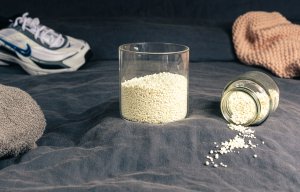
Adsorbi’s alternative to activated carbon
High-performing material derived from Nordic tree cellulose is designed for targeted pollutant capture.

4th February 2025
Innovation in Textiles
|
Sweden
Swedish startup Adsorbi, a research-based spinout from Chalmers University of Technology, has raised €1 million in funding from Metsä Spring, Chalmers Ventures ands Jovitech Invest, as well as a grant from Sweden’s Innovation Agency to advance its cellulose-based air purification material.
The capital will be used to construct and operate a pilot plant in Gothenburg, develop new products and grow the company’s customer base. Despite being only a three-year-old company, Adsorbi already has a growing customer base and industry collaborations.
“We joined Adsorbi’s journey 18 months ago and the company has achieved all the goals agreed upon at the time and even surprised us investors positively in a few areas,” says Niklas von Weymarn, CEO of Metsä Spring. “The plan for the company’s next phase was very logical and we are excited to support its implementation. The development of a pulp-based new product makes Adsorbi particularly relevant to Metsä Group’s mission as we move closer to replacing fossil-based materials in everyday applications.”
In October 2024, the European Union approved the new Ambient Air Quality Directive which prioritises public health by introducing stricter air quality standards for key pollutants, including particulate matter (PM10 and PM2.5), nitrogen dioxide and sulphur dioxide – which are all known to cause respiratory issues. The new limits, to be achieved by 2030, bring EU standards closer to the WHO air quality guidelines, pushing businesses into a race to find new air filtering solutions.
Adsorbi’s high-performing material, derived from Nordic tree cellulose, is designed for targeted pollutant capture, including key nitrogen oxides like nitric oxide (NO) and nitrogen dioxide (NO2) – major contributors to air pollution – as well as acids and aldehydes. Aldehydes are commonly found in cosmetics, perfumes, cleaning products, odourant dispensers and grooming aids. This means Adsorbi’s patented material can be used wherever gaseous air pollutants are a problem – in air filters, products that remove odours, and even in museums and galleries to protect valuable artefacts and works of art.
Unlike the current market standard, which is activated carbon, Adsorbi’s material lasts longer, doesn’t release any hazardous volatile organic compounds (VOCs) back into the air, is water and fire-resistant and changes colour to indicate when it needs to be replaced.
Adsorbi is also a more energy-efficient alternative, generating over 50% lower CO2 emissions – 3.5 kg CO2 per kilogram of material – compared to activated carbon, which has an emissions factor of 7.5 kg CO2 per kilogram of material.
“We’re grateful to our investors for their continued support,” says Hanna Johansson, CEO of Adsorbi. “Air pollutant control is needed in many markets and we’re ready to offer a commercial solution that ensures the air we breathe is clean without extensive use of fossil-based materials,”
In September 2024, Adsorbi announced a partnership with Icebug and Smellwell to launch a new generation of commercial shoe deodoriser inserts available on Icebug’s online store and at selected retailers. The company has also entered collaborations with multinational air filtration companies and launched several other products, including air fresheners for homes and sustainable art conservation products.

Business intelligence for the fibre, textiles and apparel industries: technologies, innovations, markets, investments, trade policy, sourcing, strategy...
Find out more